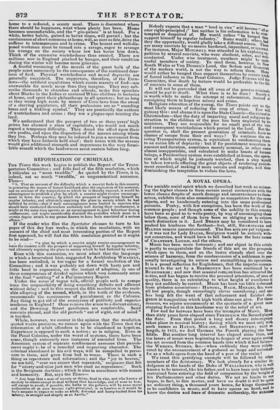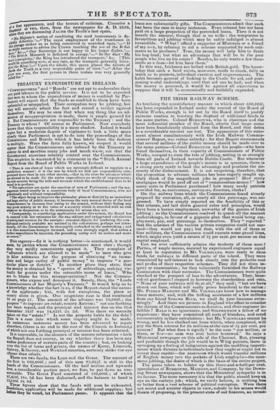A ROYAL OPERA.
THE amiable social spirit which we described last week as animat- ing the higher classes to form certain moral connexions with the lower classes despite of much damage and inconvenience to them. selves, exhibits them also occasionally as competitors for the saw objects, and as handsomely entering into the same professional pursuits. Poetry, with few exceptions, has been the work of the common people ; and though some of the nobility in this country have been so good as to write poetry, by way of encouraging those below them, none of them have been so obliging as to achieve much distinction in it. Lord BTRON may be considered to have pushed his kindness the furthest—but, still, SHAKSPEARE and MILTON remain uncountenanced. The fine arts are yet vulgarer: if it was not for Lady DACRE, Sculpture would be entirely with- out connexion, and would have to fall back upon the bare names Of CHANTREY, LOUGH, and the others.
Music has been more fortunate ; and our object in this article is partly to congratulate the friends of this art on the prospects which open to them, and on the lustre already shed over the science of harmony, from the condescension of a nobleman in per- sonally investigating its nature and exemplifying its operations. It is a proud reflection for Englishmen, that the impulse commu- nicated to the art by a BEETHOVEN has been continued by a BURGH/DISH; and now that musical composition has attracted the notice, and has begun to receive the personal attentions, of men of quality, there is no calculating to what height of excellence it may not suddenly be carried. Music has been too little redeemed from plebeian associations : HANDEL, BACH, MOZART, &E. were all low people, though exceedingly clever considering; and one has long felt the want of that refinement and finished ele- gance in composition which high birth alone can give. For these reasons, we rejoice uncommonly at the spectacle of a great man stepping forward in this handsome way to the relief of art. Few and far between have been the triumphs of Music. More than sixty years have elapsed since FREDERICK the Second played the flute. From that period a long and dreary interregnum takes place in musical history ; during which we meet only with such names as HAYDN, MOZ DIT, and BEETHOVEN; until at length, in 1815, we find GEORGE the Fourth playing the bass fiddle. But another long interval has elapsed since then, and the lovers of music were beginning to despair of ever again seeing the art rescued from the common hands into which it had fallen.— the WEBERS, SPOHRS, &c.—when suddenly they were exhila- rated by the announcement of a godsend so large and unlooked- for as a whole opera from the hand of a peer of the realm ! We trust this gratifying example will be followed by other members of the Aristocracy. We look already for a similar 10- diligence at the hands of the Duke of WELLINGTON, who is well known to be musical, like his father, and to have been only hitherto restrained from entering the field of composition by the weight of his Parliamentary and other duties. We set no limits to our hopes, in fact, in this matter, and have no doubt it will be quite an ordinary thing, a thousand years hence, for kings themselves to be candidates in music, and to have operas on hand, and do know the doubts and fears of dramatic authorship, the animal& oilis Majesty's notion of combining the reed instruments is de- Adedir defective."—" The royal employment of the trombones in mileage strikes us as being conceived in wretched taste."—" If ,.„c,asr venture to advise the Crown touching the use of the B flat Ilowern7es—e Our Sovereign is not happy in his larger flights.,'— 4, The British Monarch is deficient in energy."—" In the duet My Atari isperspiring,' the King has introduced the trumpets," &c. [This would be something new, at any rate, as the trumpets generally intro- duce the King.1—" Upon the whole, this opera places the talents of slob the Tenth in a very respectable point of view."—" After the rsee was over, the first person in these realms was very generally
tidied for."



























 Previous page
Previous page